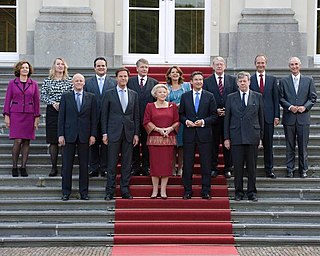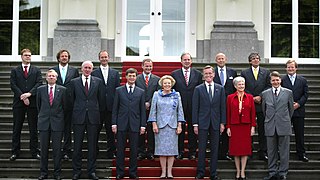| Part of the Politics series |
 |
|---|
| |
A list of most notable Dutch politicians , party affiliation given.
| Part of the Politics series |
 |
|---|
| |
A list of most notable Dutch politicians , party affiliation given.
The Labour Party is a social-democratic political party in the Netherlands.

The politics of the Netherlands take place within the framework of a parliamentary representative democracy. A constitutional monarchy, the country is organised as a decentralised unitary state. The Netherlands can be described as a consociational state. Dutch politics and governance are characterised by a common striving for broad consensus on important issues, within both of the political community and society as a whole.
The Christian Union is a Christian-democratic political party in the Netherlands. The CU is a centrist party, maintaining more progressive stances on economic, immigration and environmental issues while holding more socially conservative positions on issues such as abortion and euthanasia. The party describes itself as "social Christian".

The Christian Democratic Appeal is a Christian-democratic and socially conservative political party in the Netherlands. It was originally formed in 1977 from a confederation of the Catholic People's Party, the Anti-Revolutionary Party and the Christian Historical Union; it has participated in all but three cabinets since it became a unitary party.

The Catholic People's Party was a Catholic Christian democratic political party in the Netherlands. The party was founded in 1945 as a continuation of the interwar Roman Catholic State Party, which was in turn a successor of the General League of Roman Catholic Caucuses. The party was in government throughout its existence. In 1977, a federation of parties including the Catholic People's Party, the Anti-Revolutionary Party (ARP) and the Christian Historical Union (CHU) ran together under the Christian Democratic Appeal (CDA) banner. The three participating parties formally dissolved to form the CDA in 1980.

The Christian Historical Union was a Protestant Christian democratic political party in the Netherlands. The CHU is one of the predecessors of the Christian Democratic Appeal (CDA), into which it merged in September 1980.

General elections were held in the Netherlands on 22 November 2006, following the fall of the Second Balkenende cabinet. The election proved relatively successful for the governing Christian Democratic Appeal (CDA) which remained the largest party with 41 seats, a loss of only three seats. The largest increase in seats was for the Socialist Party (SP), which went from nine to 25 seats. The main opposition party, the social democratic Labour Party (PvdA) lost nine of its 42 seats, while the right-liberal People's Party for Freedom and Democracy (VVD) and the progressive liberal Democrats 66 lost a considerable portion of their seats, six of 28 and three of six, respectively. New parties, such as the right-wing Party for Freedom (PVV) of former VVD MP Geert Wilders and the animal rights party Party for the Animals (PvdD) were also successful, with the PVV winning nine seats and the PvdD winning two, thereby becoming the first animal rights group to enter a European parliament.

After the fall of the Second Balkenende cabinet on 30 June 2006, a cabinet formation took place in Netherlands. On 7 July, this resulted in the Third Balkenende cabinet. The minority cabinet was formed by Christian Democratic Appeal (CDA) and People's Party for Freedom and Democracy (VVD). It was a continuation of the Third Balkenende cabinet, but without ministers from Democrats 66 (D66).

This article gives an overview of Christian democracy in the Netherlands, which is also called confessionalism, including political Catholicism and Protestantism. It is limited to Christian democratic parties with substantial support, mainly proved by having had a representation in parliament. The sign ⇒ means a reference to another party in that scheme.
Roman/Red is the nickname for a period in Dutch politics between approximately 1945 and 1958. This period was characterized by coalitions between the Catholic and social-democratic parties in the Netherlands and Belgium. "Roman" refers to the parties with Roman Catholic affiliation, and "red" refers to the colour associated with social democrats. During the Roman/Red period, the Catholic People's Party (KVP) and the social-democratic Labour Party (PvdA) formed the core of several 'Roman/Red' cabinets, led primarily by Willem Drees.

The Ministry of Housing, Spatial Planning and the Environment was a Dutch ministry. It was responsible for policies on public housing, spatial planning, the environment and the housing of national government agencies. It was merged with the Ministry of Transport, Public Works and Water Management into the new Ministry of Infrastructure and the Environment on 14 October 2010.

After the general election of 9 June 2010, a cabinet formation took place in Netherlands. This led to the swearing in of the First Rutte cabinet after 127 days. The cabinet consisted of the conservative liberal People's Party for Freedom and Democracy (VVD) and the Christian Democratic Appeal (CDA), with confidence and supply from the radical right Party for Freedom (PVV).

General elections were held in the Netherlands on Wednesday 15 March 2017 to elect all 150 members of the House of Representatives.

The third Rutte cabinet was the cabinet of the Netherlands from 26 October 2017 until 10 January 2022. It was formed by a coalition government of the political parties People's Party for Freedom and Democracy (VVD), Christian Democratic Appeal (CDA), Democrats 66 (D66) and Christian Union (CU) after the general election of 2017.

A process of cabinet formation took place following the 2021 Dutch general election, leading to the formation of the Fourth Rutte cabinet in 2022. The coalition consisted of People's Party for Freedom and Democracy (VVD), Democrats 66 (D66), Christian Democratic Appeal (CDA) and Christian Union (CU), the same parties that formed the preceding Third Rutte cabinet. At 299 days, it was the longest formation in Dutch history.

After the Dutch general election of 15 May 2002, a cabinet formation took place in Netherlands. This resulted in the First Balkenende cabinet. The coalition was formed by Christian Democratic Appeal (CDA), People's Party for Freedom and Democracy (VVD) and the Pim Fortuyn List (LPF).
A process of cabinet formation is taking place following the Dutch general election of 22 November 2023.